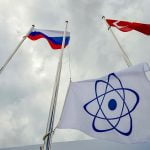As Europe tries to lessen its dependence on Russian energy after the Kremlin’s invasion of Ukraine, the EU is turning to Azerbaijan and the Eastern Mediterranean as potential gas suppliers.
Azerbaijan has discovered potentially promising gas fields, but they are all at varying stages of exploration and appraisal, Charles Ellinas, a senior fellow at the Atlantic Council’s Global Energy Center, told NE Global, adding that Azerbaijan certainly has the potential to supply more gas to the EU, and the capacity of the Southern Gas Corridor can be expanded to accommodate this by adding additional compression. But this requires sanctioning additional production. As a result, there is uncertainty about how much extra supply they could provide in the short term until the necessary agreements are reached. Longer-term, their development needs assurances from the EU that it requires new gas beyond 2030 to unlock the necessary investments, Ellinas said.
The EU and Azerbaijan signed in July an MoU to double imports of gas to at least 20 bcm a year by 2027 and expand the Southern Gas Corridor, including the Trans Anatolian Pipeline (TANAP) and the Trans Adriatic Pipeline (TAP).
Azerbaijani Energy Minister Parviz Shahbazov said on September 12 that according to operational data, 7.3 billion cubic meters (bcm) of gas was exported to Europe, 5.4 bcm to Turkey and 1.7 bcm to Georgia within the 8 months of this year. “During this period, gas export grew by 23%,” he wrote in a tweet.
Shahbazov also said that he had “fruitful discussions” with the president of the European Bank for Reconstruction and Development (EBRD), Odile Renaud, on the financial support for the expansion of the SGC running through Azerbaijan, Georgia, Turkey and Greece and the priorities for multifaceted cooperation between Azerbaijan and the EBRD on green energy. “The Ministry and EBRD are planning to sign a Memorandum of Understanding on technical support for the development of the energy sector,” Shahbazov said.
Turning to the East Mediterranean, Ellinas told NE Global that between Cyprus and Israel there could be about 630 bcm of unutilized natural gas in the East Med, available for exports. This includes 300 bcm at Israel’s Leviathan gas field and close to 330 bcm in Cyprus: about 120 bcm at Aphrodite, 140 bcm at Glaucus and another 70 bcm at Italian ENI’s newly discovered gas field in Block 6, Cronos-1. “And of course, with exploration activities having resumed, there is potential for more gas discoveries,” he said.
“Once confirmed, such resources are sufficient to supply the EU with 25 bcm per year over a 25-year period, about a sixth of Russian gas supplies to Europe in 2021,” Ellinas said. “But their development hinges on overcoming EU’s reluctance to acknowledge that it will need natural gas longer-term, long after 2030,” he added.
Ellinas argued that if this policy remains, it will discourage oil companies and institutional investors from investing in long-term projects that depend on supplying the EU with gas. Over the next nine years the MoU signed between the EU-Egypt-Israel signed in June ensures that up to 7bcm/yr East Med LNG is supplied to Europe.
“East Med gas is indigenous to Europe and can supply gas reliably and at competitive prices. As a minimum, it can replace the decline in Norwegian gas supplies, as we approach 2030 and beyond, and contribute to EU’s security of energy supplies,” he told NE Global.
But Cyprus MEP Loucas Fourlas noted that while both European Parliament President Roberta Metsola and European Commission President Ursula von der Leyen visited the Mediterranean island recently and said Cyprus’ energy deposits are European deposits there is no clear plan to develop them. “They (East Med deposits) could help with EU energy security until hydrogen and renewables are developed. We see that Norway provided a solution,” he told NE Global on a flight from Strasbourg to Athens after the plenary session on September 15.
A day earlier, von der Leyen gave her State of the Union address (SOTEU) at the parliament. “In her State of the Union address, I expected her to say something about how Europe can develop its own resources including Cyprus,” Fourlas said and quipped, “She did not say a word!”








